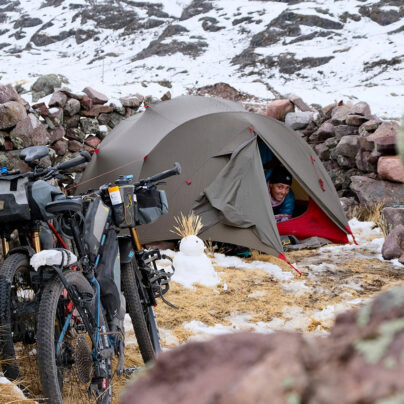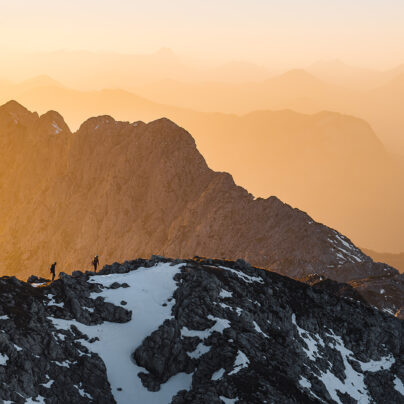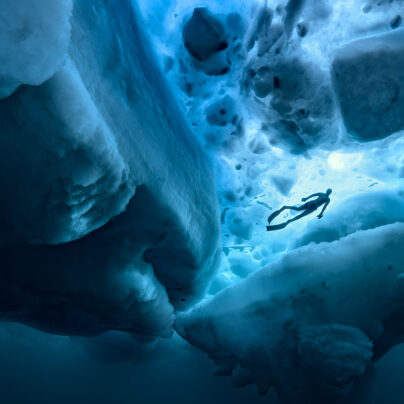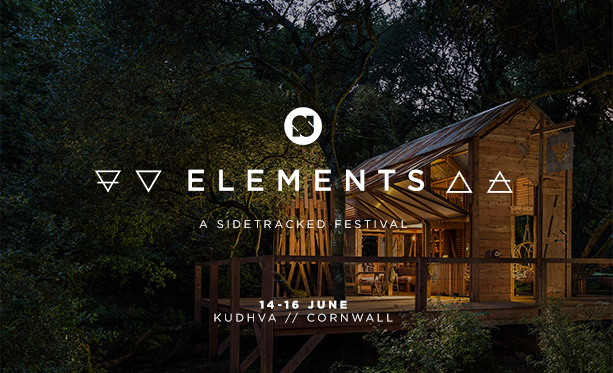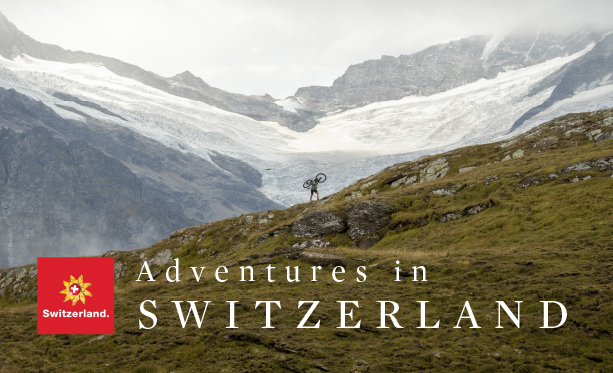Vanishing Lines
Inspiration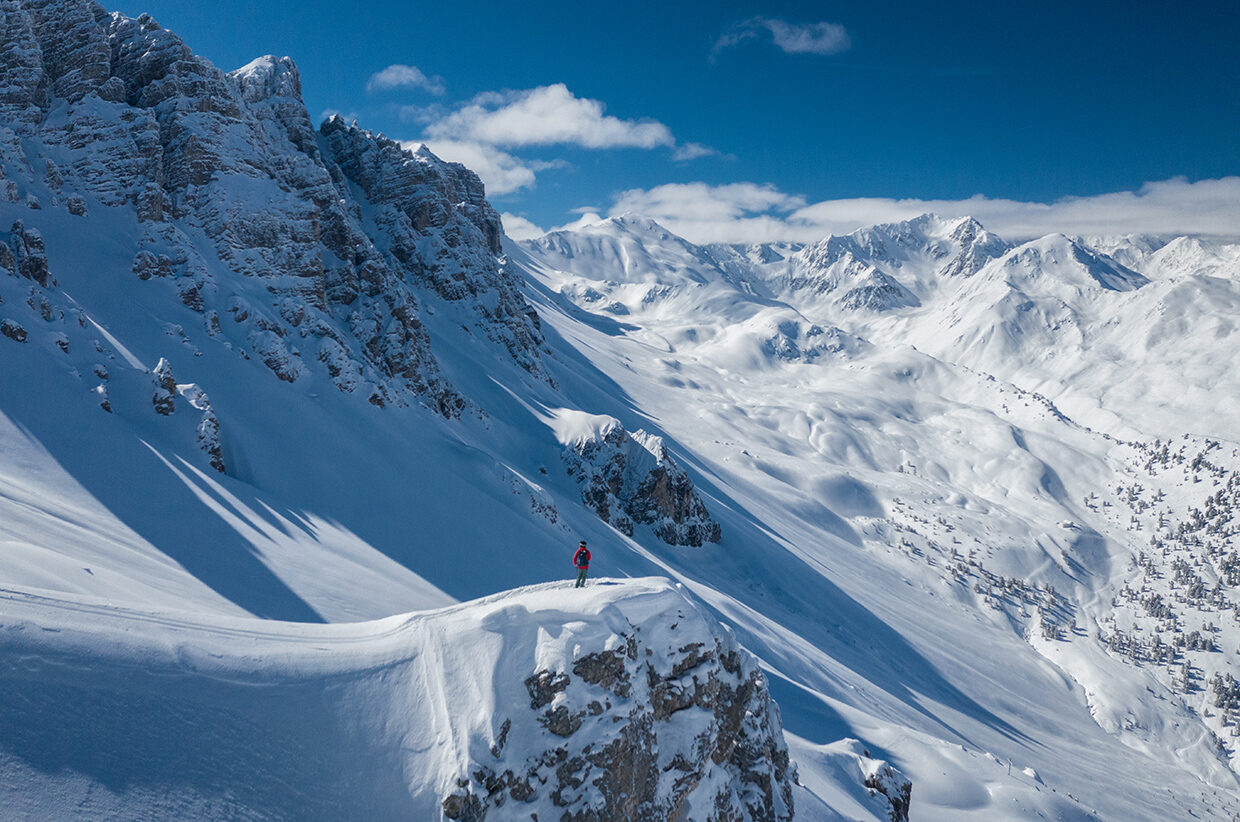
In Conversation with Lena Stoffel and Mitch Tölderer
The pristine high landscapes of the Alps are at risk as developers encroach ever further in the name of expanding ski resorts and their infrastructure. Vanishing Lines tells the story of these last wild places on the brink of destruction, and the movement to protect what we still can. The 20-minute documentary, filmed in Tyrol, Austria, features Patagonia snow ambassadors Lena Stoffel and Mitch Tölderer.
Sidetracked: Hi, Mitch and Lena – where are you both now and what are you up to?
Lena: For the past two years I have lived in Patsch, a village at 1,000m elevation just outside of Innsbruck. Over the last few days it has been snowing and winter is starting. So I am getting my gear ready, and will probably head out in a bit to the woods and ski tour in the valley around here today.
Mitch: And I’m here at my home in Innsbruck, just back from snowboarding with my family at our little ski resort on our home mountain.
What is the local Alpine area like where you live?
Mitch: The local mountain range I can access by walking out the door of my house is rough, steep, and framed by three small ski resorts. The backcountry there isn’t easy, so it’s still quiet, especially during the winter.
Lena: Around Innsbruck there are a lot of mountains surrounding the city in all directions. You have the Karwendel Mountains in the north, starting with the Nordkette and then continuing to very wild, pristine, and steep peaks. Then you have the south side of Innsbruck and all the valleys there, which are also very rural and beautiful – plus many fun ski resorts and the glaciers there as well.
How important are the backcountry and untouched spaces to you and your local community?
Mitch: Very important to me, I would say! I think people living here have always enjoyed hiking in summer and ski touring in the winter – and over the past decade the number of newcomers to these activities has risen. I think all of us are looking for the same thing: an activity in a quiet natural environment to balance the increasingly technology-controlled and faster-spinning world we are living in.
Lena: The backcountry is also very important to me because it means peace of mind. A place of strength. A place of calm. A place of history and culture. It gives me a sense of belonging, and to discover and experience those places with respect makes you realise that you need to leave them untouched when you go home. I think for the community in Innsbruck it’s very special to have all this around us, but I also think it needs to be understood that these places need to be protected, not blown out by mass tourism. The local community needs to protect them and leave them as they are, because we all gain so much from them.
How did you go from skiing and snowboarding in resorts to heading into the backcountry? And when was the moment you knew that was your focus or passion?
Mitch: When I changed from skiing to snowboarding more than 30 years ago, deep fresh snow became really interesting and desirable. I started with riding off piste in resorts, then hiking with snowshoes to try and get a little further. I always loved riding in the backcountry and when I got sponsored I could go on film trips, using helicopters to gain access to ride the lines of our dreams. Then about 12 years ago I turned my focus back to my home mountains. That was when I really started to get into human-powered backcountry. Heli access wasn’t really an option in Austria, so I cut one of my boards in two and built my first splitboard to be able to access the backcountry and search for good lines. With some friends I started working on a freeride film called HIKE – A Freeride Project in the Austrian Alps, and since then I have been hooked.
Lena: I grew up skiing the resorts and doing Alpine racing, but my parents took me and my brother to the powder as well from an early age. So, for me, skiing powder, when there was powder in the resort, has always been the best. Being part of the freestyle side of the sport and the scene here in Innsbruck showed me more and more what skiing meant to me. It has always been about being outside in the mountains, breathing the cold, fresh air, but also about sharing it with like-minded friends and family. It’s been a natural transition for me to go from the competitive side of Alpine racing to slopestyle and freeride competitions, then into the backcountry and nature-based photography and film projects. More and more I focus on touring projects in places like Norway or Japan – and now here at home in Patsch I have discovered more great touring opportunities in my local area.
In your opinion, what is so special about untouched Alpine areas?
Mitch: Only seven per cent of Austria’s land is considered to be in a natural state or widely untouched. The vast majority of this seven per cent is in high Alpine areas. These regions are under increasing pressure from infrastructure projects, so these are the very last pristine areas we can preserve for us, our kids, and for nature.
Lena, in Vanishing Lines you say that ‘one feels so framed’ by the mountains. Can you explain in your own words what you mean by that?
Lena: The feeling that untouched Alpine places give me is so special. It’s hard to describe, but they are powerful and happy places. The mountains frame the place you are in at the very moment you are there. It can be super rough, scary, and big, but at the same time it’s quiet and the mountains surround you and ground you. For me it’s a place of being framed and a place to be protected.
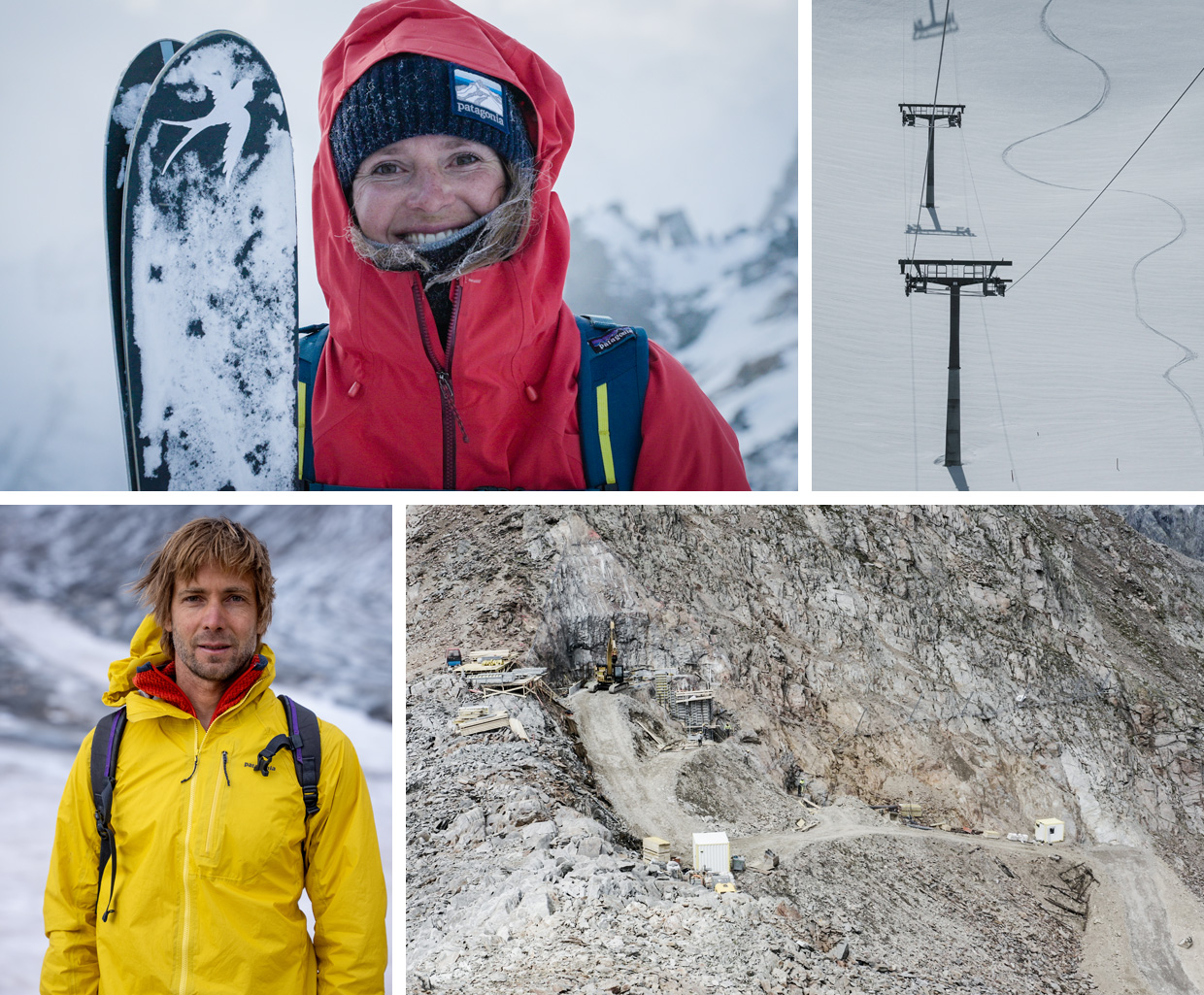
There is a comment in the film about lobbying for nature. Is that part of what you are doing? How can we give nature a voice?
Lena: I am trying to give nature a voice through my passion for photography, and also through sport and the places sport takes me to. I gain so much strength from nature. Through my channels, and by capturing what I experience, I am trying to translate this gain. In the best-case scenario, I hope it motivates and encourages others to treat nature with compassion.
The discussion in Vanishing Lines around the ski-resort extension has been going on for a while already. Mitch, can you give us the background on it?
Mitch: ‘Europe‘s largest continuous glacier ski resort’: that is the attention-grabbing title for a plan that would see two ski areas in Tyrol fuse. The ski resorts Pitztal Glacier and Ötztal Glacier/Sölden are planning an enormous construction project, connecting the two areas – and, as some of the construction would take place directly on glacial terrain at over 2,800m, it would dramatically change the natural landscape. The planned expansion would stretch from Mittelberg in Pitztal over Griestal up to the Linker Fernerkogel, a pristine mountain with three glaciers.
The Pitztal–Ötztal project threatens to further reduce the area that remains in its natural state. Amongst the planned construction projects are three new ski lifts, a three-storey ropeway station, an asphalted water reservoir, additional artificial snow systems, more than 4km of new roads, the levelling and removal of ice on 72ha of glacier terrain, and plans to grind down a mountain ridge by 40m. The construction of the ski resort would destroy a natural glacier landscape beyond repair. Severe intrusions would cause the loss of many habitats.
Can you tell us a bit about why you started this film project and what the process has been like?
Mitch: My journey leading to this film project began about seven years ago. A pristine valley in the Arlberg region that has been appreciated for decades for its beauty in winter and summer was meant to be destroyed by the plan to extend one of the biggest ski areas in Austria. I realised that, once this destruction took place, this beautiful valley would be irreversibly lost. So, I started to think about a film project to get the word out to the freeride and backcountry community.
Lena: I thought that the combination of Mitch snowboarding and having a family, together with my perspective of skiing and growing up in this sport, would be a nice one. So I found it very exciting to be part of the project and show how good we have it here in my home mountains, but also to look behind the scenes at how frustrating and devastating the plans are – and what they would do to the last remaining wild places here. I felt that it was a good thing to stand up for those places and show how they give me strength.
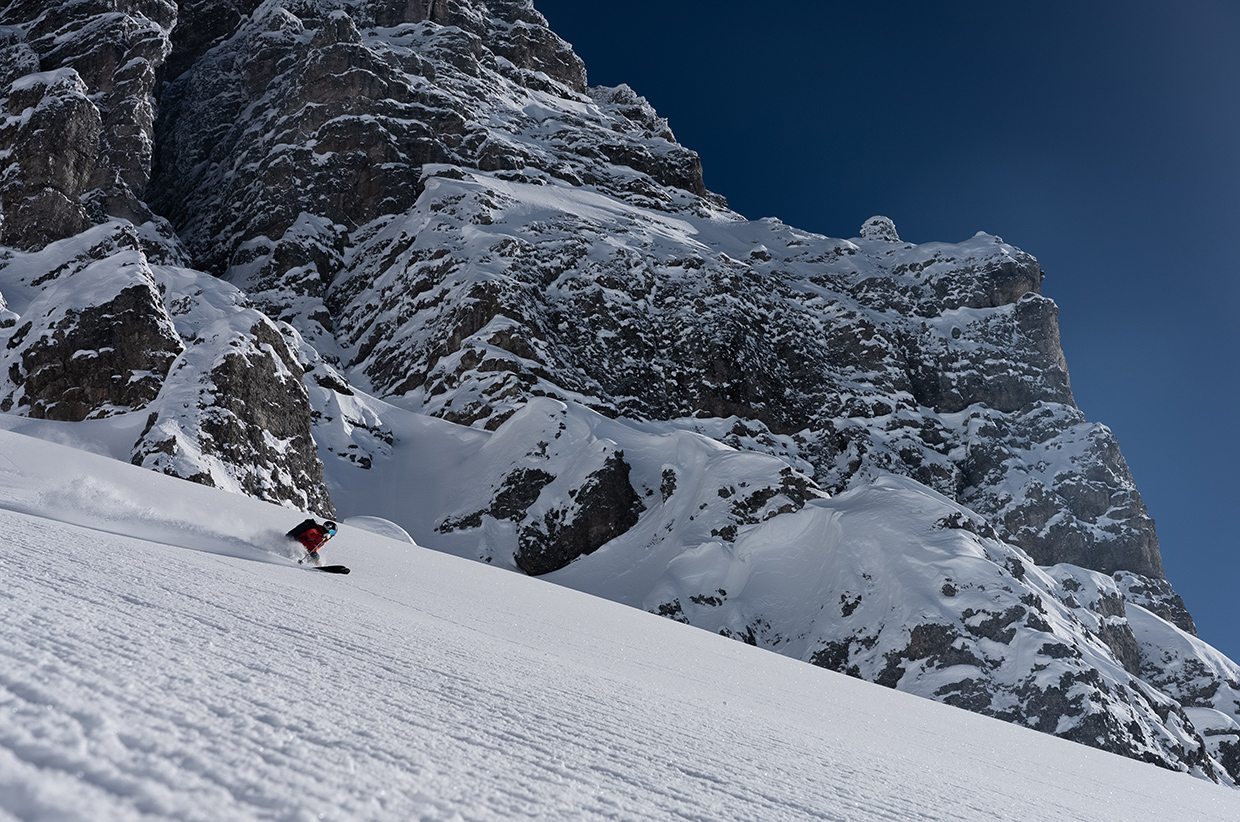
What did you learn in the process of making this film?
Lena: I learned a lot about what it takes to build ski lifts in the first place – what roads need to be built, and what the process actually destroys. Also, skiing in the empty resorts last season when Covid shut down some of them was eye opening. To realise how much infrastructure it takes, and how out of place it looks on those mountains when not used – it didn’t feel right. The main thing for me to take out of this is that we are blessed with these mountains, and also blessed with the resorts we have, and the opportunities those provide us to ski and access beautiful nature. But we don’t need more. It’s not necessary to expand; it is necessary to make the resorts we have more sustainable. It’s also necessary support the small resorts.
The project was filmed in Austria, but the issue is not only a local one. What do you hope this film will highlight as it travels across Europe?
Mitch: I hope that this piece can contribute some thoughts, and cause discussion, reaction, and action to help to protect what is left of our natural mountain wilderness.
Lena: First of all, I hope it highlights the beauty of wild places and what we gain through them, and secondly, I hope it shows the destruction and the harm the expansion plans will bring to nature – and to us.
What do you hope the audience does to help the fight against this expansion, or to protect their own local wild spaces?
Mitch: I hope that the audience is sensitive to the impact further expansions would have on untouched natural environments. Everybody who cares can get informed about upcoming projects online, and can sign a petition or start a discussion to protect their local wild spaces.
Lena: I hope they stand up for the places they love. I hope they go out and experience nature with respect and share their experiences and the things they gain out of wild places. I hope they sign petitions and speak out!
Watch Vanishing Lines and find a local NGO fighting for wild places online at patagonia.com
Lena Stoffel // @lena_stoffel
Micheal Toelderer // @mitch_toelderer
Patagonia // @patagoniaeurope
Photography by Johannes Aitzetmüller // courtesy of Patagonia
